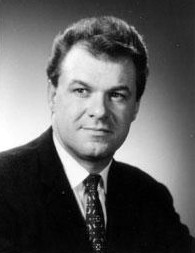Awards
- National Academies - 1961
- American Association for the Advancement of Science

Norwood Russell Hanson was born August 17, 1924 in New Jersey. The son of Samuel Norwood and Hannah Helen (Proper) Hanson, he studied trumpet and played at Carnegie Hall but his musical career was cut short by World War II when he enlisted in the U.S. Coast Guard later transferring to the Marines. He served on the ill-fated USS Franklin in the VMF-452 "Skyraiders" Squadron and when the Franklin was bombed in 1945, his Corsair was described as "the last plane off Big Ben."
Hanson earned his degrees at the University of Chicago (B.A. in philosophy) and Columbia University (B.S. in 1948, M.S. in 1949 both in physics) and then Oxford and Cambridge as a Fulbright Scholar. In 1957, he founded the IU Department of History and Philosophy of Science, the first of its kind, and was a fellow at the Institute for Advanced Study at Princeton. He continued to fly, and was known during his brief time teaching at Yale University as "The Flying Professor."
He was an American philosopher of science and was a pioneer in advancing the argument that observation is theory-laden--that observation language and theory language are deeply interwoven--and that historical and contemporary comprehension are similarly deeply interwoven. His single most central intellectual concern was the comprehension and development of a logic of discovery. Hanson's best-known work was Patterns of Discovery (1958), in which he argues that what we see and perceive is not what our senses receive, but is instead filtered sensory information, where the filter is our existing preconceptions--a concept later called a "thematic framework." Hanson's framework became influential after Thomas Kuhn's The Structure of Scientific Revolutions (1962) made his interdisciplinary view generally acceptable. Similarly, Robert Nozick's 1974 Anarchy, State, and Utopia, also built from Hanson's theories, further expanded the reach of Hanson's influence.
Hanson's other books include The Concept of the Positron (1963), and posthumous works What I Do Not Believe and Other Essays (1971) and Constellations and Conjectures (1973). Hanson was a Ford Foundation Fellow, an American Council of Learned Societies Fellow, Rockefeller Fellow, Carnegie Fellow, and was elected to the American Association for the Advancement of Science. Hanson died in 1967 in a plane crash in New York at the age of 42, with ten books in progress.